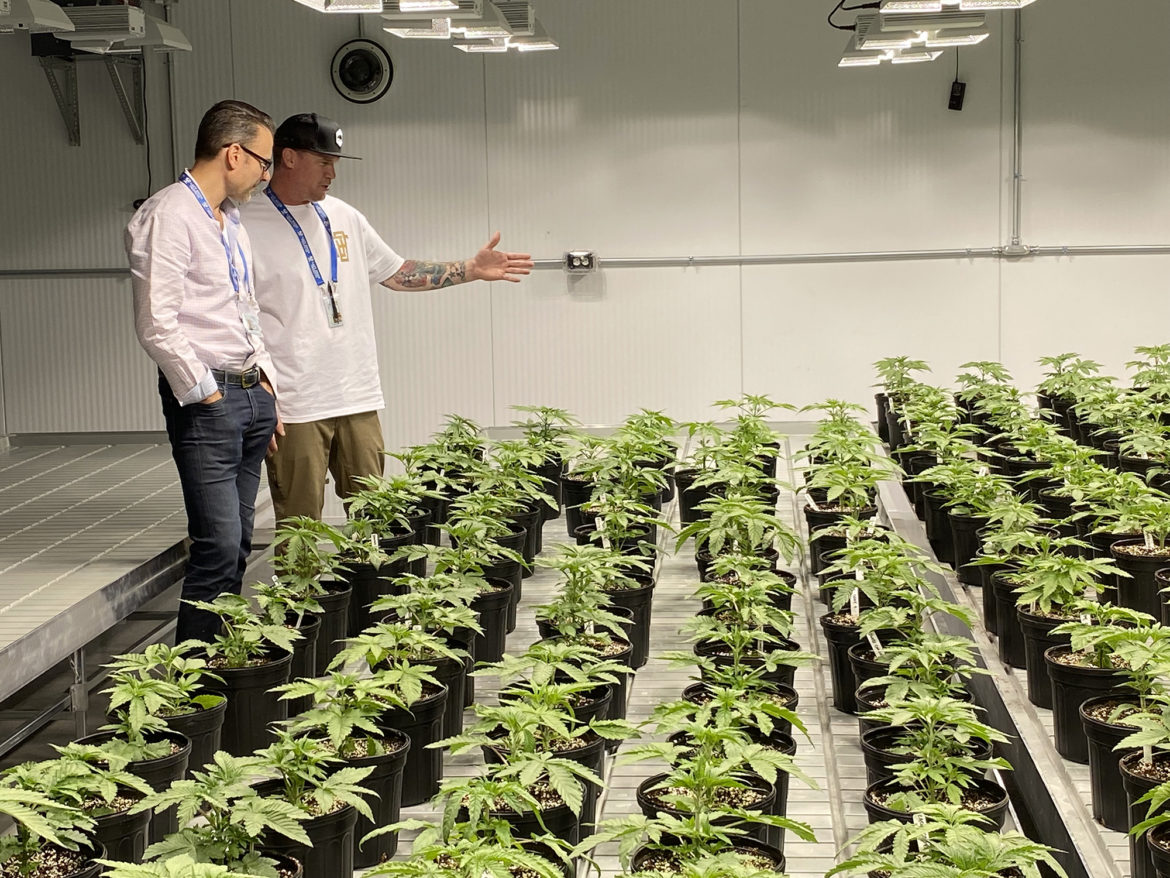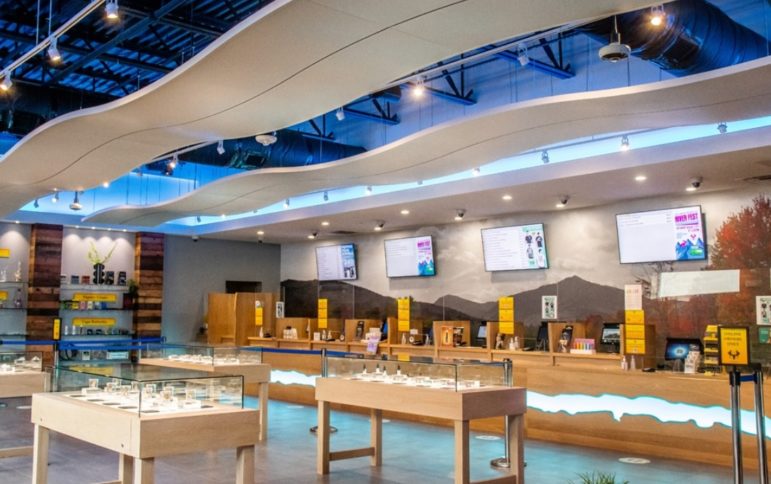
How Massachusetts is fighting the war on drugs with cannabis. Would it work in New Hampshire, which is now surrounded by states that have all legalized recreational marijuana use for adults – Maine, Massachusetts and Vermont.
House Bill 1598, which would legalize the recreational use of marijuana in New Hampshire, was approved by the House Wednesday on a 235-119 vote. Supporters and opponents repeated many of the same arguments they have for years touting potential revenue on the plus side and turning state agencies into drug cartels on the downside. The bill now must be reviewed by the House Finance Committee before a final vote and if it passes, faces an uphill battle in the Senate.
By BEVERLY STODDART, InDepthNH.org
On a rare 50-degree day in February, I sat down with William Cassotis, president and CEO of Lazy River Products in Dracut, Massachusetts. Its website states that it is Massachusetts’ premier recreational marijuana dispensary. He is a tall, thin man who is energized and passionate when talking about cannabis, the term he uses for his company’s products. He grew up in Londonderry and still lives in Southern New Hampshire.
At just 10 miles from the New Hampshire border, Cassotis explains that southern New Hampshire residents are happy to drive over the border and pick up their cannabis. “We see it every day.”
I ask him why New Hampshire seems afraid of allowing adult-use recreational legislation?
“It certainly wouldn’t be for the tax reasons,” Cassotis said. “I’d have to check the exact figure, but I think it is $2 billion in sales since Massachusetts launched in 2018. That’s a tremendous amount of sales. The tax on that is 20 percent. Do the math. That’s a tremendous amount of capital being recycled back into these local communities and the state itself. So, it’s certainly not for that reason. Don’t make the mistake that everybody in New Hampshire who wants to buy recreational cannabis isn’t doing it.”
New Hampshire Buys
“They are. They’re just doing the exact opposite of what was happening for so many years with the relationship of Massachusetts and New Hampshire with things like alcohol and tobacco. All the Massachusetts residents would drive up to New Hampshire to purchase alcohol and tobacco and still do today,” Cassotis said.
You know there are New Hampshire customers because you have to check a license to come in to the dispensary.
“We do. The law does not say we cannot sell to somebody with a New Hampshire-based license. Of course, we can. The assumption then is that person is consuming the product in Massachusetts because it is federally illegal to bring it back over state lines. We can’t attest to what happens to the product after it leaves our store. We educate all of our customers on the legality issues and how things work with the law. That deters no one, quite frankly. And so, the state is missing out on a tremendous amount of capital.”
Surely, the state must know the amount of revenue cannabis is producing for Massachusetts.
“I don’t know if they are aware to the extent of that they are losing out. I think they have an idea. The people in the statehouse are watching this very closely at this point. There have been a number of laws and bills proposed on a number of occasions. They’ve all been shot down. They never made it to the governor’s desk. But, even if they were to, Governor Sununu has made it very clear that he refuses to support this and will be vetoing any cannabis legislation that comes across his desk. At least that has been his position up to this point. We’re hopeful.”
Why did you open up in Dracut, Mass.?
“Dracut was one of the first communities to adopt the bylaws necessary to accommodate cannabis businesses in Massachusetts. The state took a vote on cannabis and passed it. They then gave every city and municipality the option to vote and decide if that municipality wanted cannabis businesses in their town. Only about 50 percent of the towns and cities said yes. The others said no. Of those who said yes, not all adopted their bylaws immediately. A lot went immediately into moratorium. Dracut said yes and started forming their bylaws to say where these businesses could go. The rules were determined very early and were our first determining factor to choose here. The second factor was we are surrounded by a number of ‘no’ communities. They decided not to opt into cannabis. Places like Andover, North Andover, Methuen, Lawrence, these are all ‘no’ communities. They are near or abut Dracut. And all of those communities will not have places to shop for cannabis. Dracut becomes the closest place they can drive to.”
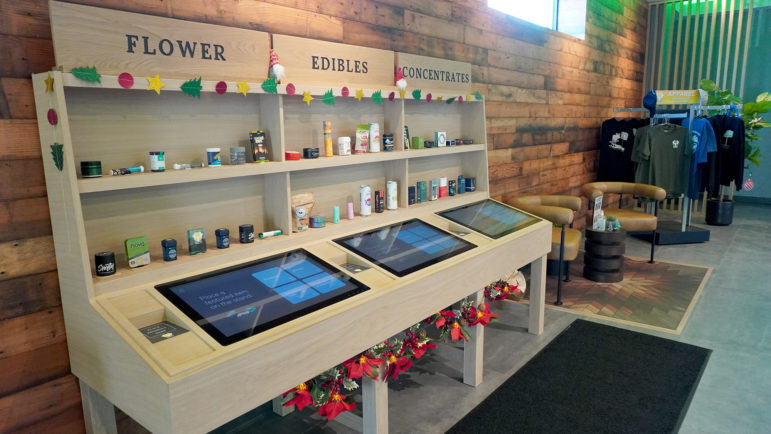
Let’s talk about the business. What is a vertically integrated cannabis model?
“The term integrated model implies we are doing everything. There are three different license types. We have all three. There is retail, there is product manufacturing, and there is cultivation. There have since been some licenses come into effect, like delivery licenses. Two forms of delivery licenses have been designed primarily to lower the barrier of entry for people who have been disproportionately impacted by the war on drugs over the years. The state always envisioned this cannabis program being designed to help those people who have been negatively affected over the years.”
“To do what we are doing here requires an unbelievable amount of capital. You can’t go to a bank and borrow the money because the banks are backed by federally insured dollars or by the FDIC, and therefore they will not lend to anybody involved in an illegal business. Even if you are in a state where cannabis is legal, it is not federally legalized. Banks, especially banks doing business in multiple states, refuse to do business with cannabis companies because of federal illegality. To do this, you have to have that capital in advance.”
Delivery Driver Program
“The state designed delivery driver programs initially to help benefit the people that have been disproportionately affected by the war on drugs, to help bolster those people up. They’ve been arrested, they’ve been thrown in jail, they’ve been persecuted for a gram of cannabis in their pocket or been pulled over and have a joint in their ashtray, or a gram of cannabis in their console and have their car searched and end up doing jail time over having a very small amount of cannabis on them because it is federally illegal.”
“So, the state always said that if we’re going to do this program, we want to make sure that these people who have been so negatively affected by all of these rules and regulations surrounding cannabis, and the negative things that have come out over the years, let’s design this program to help build these people up and give them an opportunity. It’s difficult for anybody in that situation, coming from one of those areas, not having the support and not having deep pockets, not having the education to go to different resources or know-how to raise capital, they are missing out on these opportunities.”
“The state said listen; we’re seeing all of these big opportunities going to groups like ours. And so, with the way they structured these delivery licenses, they tried to lower the barrier of entry because they saw all these ways of entry going to white men. The opportunity was designed to develop and bolster black and brown communities, quite frankly.”
That was how the Massachusetts leadership built this idea?
“It is. It was to change these areas that have been so decimated by the war on drugs. A part of the area we contribute to is Lowell. So, part of your licensing process is to form a diversity plan and a positive impact plan. On the diversity plan side, you need to talk about how you will be employing residents in the community you have your agreement with. Ours is in Dracut. So how are we going to help the local community of Dracut? How are we going to provide more jobs and opportunities to these people?”
How many employees do you have?
“We have 65 employees right now. We serve adjacent communities. Lowell is one of these communities that has been disproportionately impacted by the war on drugs over the years. As a part of what we do with our hiring strategies are job fair opportunities, we are targeting down in Lowell to bring employment opportunities.”
Diversity Plan
“There are a number of things we have to do in our diversity plan. Everybody perceives this industry to be a money grab. There is that aspect, but the whole core of this program is based on targeting areas, individuals, and family units that have been disproportionately impacted over the years. Police departments and officers have been encouraged to go out and arrest people in these communities because of such a large drug presence. The goal was to arrest as many people as possible and put them in jail, which would drive change. They were going to punish these people so much that at a certain point, they’re going to say, you know what, I’m not going to take the risk. I’m just going to change my way of thinking. It has been the opposite effect. It is a failed idea. The state finally recognized this and said, how can the state use cannabis as an opportunity to help change this instead of continuing to drive these communities down a hole.”
“We are currently not doing delivery services. We will. All those opportunities are reserved for social equity applicants. There are two delivery licenses the CCC has brought to reality. (Cannabis Control Commission-the governing body that oversees all cannabis licensing.) They recently voted them in last year and have given all of the opportunities for adult licenses to social equity applicants. It means I need to be a minority, Black, Brown. I need to live in an area that has been disproportionately affected by the war on drugs. So, the state has carved out a niche for these people. The reason I was explaining all of what we are doing here, this takes so much capital. Somebody coming from downtown Lowell who has been negatively affected by the war on drugs, their families have been affected by it, and they are in that trap trying to find a way out, they may not have that opportunity to raise the amount of capital to do what we are doing. But what they do have is a very specific opportunity with these delivery licenses because the barrier of entry is so much lower from a capital expenditure. This is an easy step into cannabis. First, they have to become a social equity applicant and go through the approval process. Once you qualify, you have exclusive access to these two license types for three years. There are two new licenses, and they are both delivery-related. (https://masscannabiscontrol.com/equity-programs)
“It would be wise if the state of New Hampshire would pursue this to implement portions of the Massachusetts model into their own because it is of great benefit to the people that have been so unfairly treated over the decades. Generations of people have been held down.”
When were they passed?
“Sometime in 2021. The delivery licenses are unique. One is no investment in any infrastructure. They just have this delivery license. They can have their base of delivery clients that call and request a purchase at Lazy River Products and order, for example, a specific type of flower. It’s just like Uber Eats or any of these food delivery services right now where they get to charge a fee for making that delivery for their client. In this example, we are the restaurant, and they are the delivery service in that model. Even though the law was passed in 2021, they are just starting this year. They have to fill out all of the applications and prepare for this.
“If I have zero money and I want to get involved, you can see how easy it is to become a delivery person, and I can step in and provide myself an opportunity and create my own business, become an entrepreneur and start generating revenue immediately. That is option one for social equity applicants, and it is exclusive to that group for three years and opened up across the state. Applicants have to have lived there for a predetermined period, there are income qualifications, but these are exclusive licenses once you qualify. One has a very low barrier, and the other model is a step up from that.”
“It is called a warehouse delivery license. The warehouse model allows me to physically build a warehouse structure or lease a building that has already been built as warehouse space and outfit it with security. I need to build a vault inside that space to make sure no one can break into it from the outside and steal the cannabis. It’s a bit of an extra step. They would then buy products from a wholesaler like us, keep it in their warehouse, and then make those deliveries out of their warehouse.”
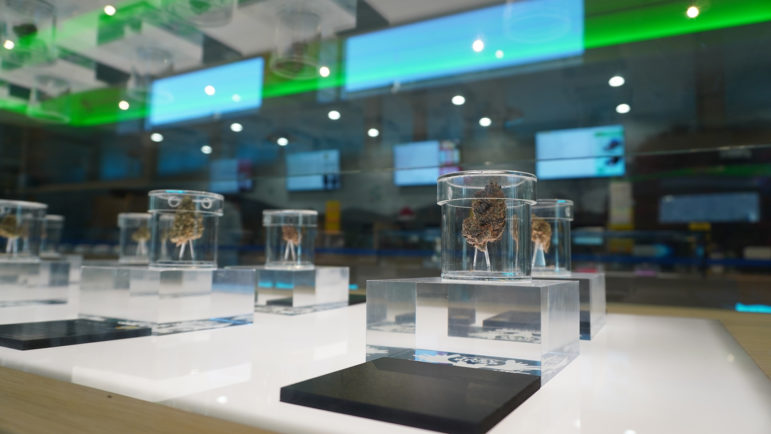
Can they price their products the way they want?
“Yes. They are buying the product wholesale, and they would be retailers. This is why this license has caused so much controversy in Massachusetts because guys like us have invested millions of dollars and years of our lives in getting retail businesses off the ground. Then all of a sudden, after all that work, these places start to get rolling and just start to open, perhaps still in the application process, which can take years, and then last year, CCC opened up the doors to social equity applicants who don’t have to wait. They don’t have to invest the capital. This is, in essence, a glorified retail model without having to do everything the retailers have had to do.”
Can you then go to them as a retailer, like you have in your facility?
“No. They would not have a retail storefront. They have their warehouse. The only thing they can do out of that warehouse is deliver to the customer. They can mark up the price to retail. They can’t have customers go to them. it’s a quasi-delivery model.”
How do you feel about the warehouse license opportunity?
“It doesn’t bother me as much as it is bothering a lot of other people because my vision is more long-term.”
Because you are growing it.
“Yes. We are a wholesaler, so we will be helping to feed that market. That’s one of the biggest differentiators between a lot of the other players out there and us. Now, we can go back to our model of vertically integrated cannabis. We are fully integrated. We decided to go that route and invest the amount of capital we did at the time and went through the pain of getting licensed at the same time because we understood where this whole thing was going to go long term.”
“Even without the delivery piece, the retail piece is the lowest barrier of entry. How did we know where the market was going to go? We knew because there would be more retailers than anything else. Because it costs so much to become a cultivator. It costs so much to open up a lab and a kitchen and start producing products. That’s the capital-intensive side. To open up a retail store, I can do that for a few million dollars. Yes, that’s a tremendous amount of capital. But at the time, that was the lowest barrier of entry. We knew there would be more retailers for licenses than any other type of license in Massachusetts. By that, we knew we wanted to be a retailer and to be a wholesaler. To be a wholesaler and develop brands and push your brands out into other retail stores, you’ve got to be a cultivator, and you’ve got to be a product manufacturer.”
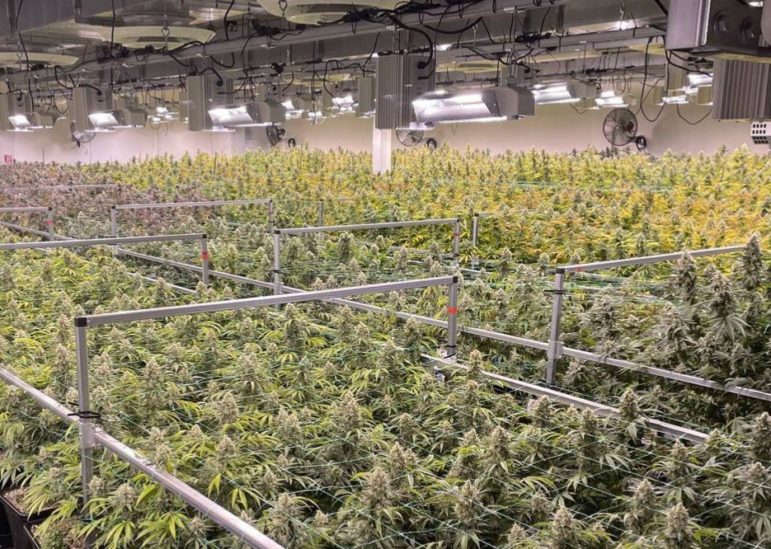
What types of products are you looking to create?
“For us, we wanted to create all products. That meant not just having a lab but also having a kitchen to produce things like chocolates, gummies, hard candies, things of this nature. These are the new and exciting products consumers look for in cannabis today. Gone are the days when you only go and get flowers and then roll it up into a joint and smoke. Now there are a thousand different products out there and a million different ways to consume cannabis.”
I am not a consumer of this product.
“You are not a minority. Many people don’t understand this industry and don’t understand the benefits. And I think this is a big reason why New Hampshire is behind all of this right now. It is a lack of understanding from our politicians and the people making these laws up in the statehouse. I believe there is an opportunity for New Hampshire to learn from all of the other states surrounding them participating in cannabis.”
“All around New Hampshire, cannabis is prevalent. Even in places like Vermont, where they don’t have a retail model, they have still passed laws allowing medical patients to grow their cannabis so they can at least produce their own medicine. There is a medical cannabis program in New Hampshire. Part of the problem with that program is that the qualifying conditions to become a medical patient in the state of New Hampshire are incredibly high. There’s a very short list of qualifying conditions—things like glaucoma, acute pain, cancer. If you cannot eat food because you’re on cancer medications, then yes, you can take more prescription drugs to help that problem potentially. Still, more and more people today are steering towards more alternative forms of medicine instead of pumping themselves up with more prescriptions. So, there is a base medical program in place in New Hampshire, but the qualifying conditions are you need to be dying or in incredible critical pain as diagnosed by a doctor to secure a medical card to then buy it.”
(NH Patient Application for the Therapeutic Use of Cannabis: https://www.dhhs.nh.gov/oos/tcp/documents/applicationpatient.pdf)
Then as a patient with a medical card, you would have to go to a state-sanctioned cannabis dispensary.
“You would.”
Where do NH State Dispensaries get their cannabis?
“Part of the way it works in New Hampshire and with most medical programs states are bringing on, the people that are moving into those areas have to invest in infrastructure as we did here. They’ve got to make a big investment. For some of those companies, they invested early because they are in there for the onset of medical, with the hopes that at some point, the state is going to change over to a recreational cannabis model or an adult-use model where they can sell their products to the general public. And because they were in the state early and already established their core base of operations, infrastructure, and core products, they can supply products to their medical base of clients. That’s part of the medical model. You have got to produce your products and grow your flowers. If you are sourcing products from other people in the market, you would never do that over state lines because of federal illegality. Even if both of those states are legal in their own right with cannabis legalization, you cannot bring cannabis over state lines. These dispensaries are already growing their own and producing their products.”
Like you are doing.
“Correct. They are already doing that only to the point where they are fueling and supporting their localized customer base. So, if I’ve got a spot in Dover or Merrimack, those people are growing that product and dispensing it into that retail, and they are servicing that group of medical clients in their local area.”
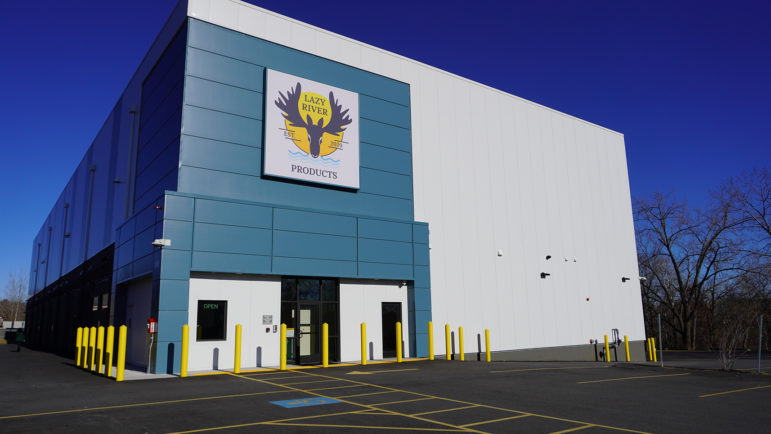
How do you grow your market?
“Stress affects different people in different ways. Some have mild cases of stress that are very easily managed. And some people have really bad days, and it can compound. These things have been known to lead to other mental issues. Everybody seems to be conscious about mental health these days.”
“The science is there to back up the fact that you can use this in very small doses to treat depression in people that have been suffering. Up to this point, the only way to treat depression is with drugs, prescription medication. And so, you go to a psychiatrist or psychologist, and they treat you, and ultimately at the end of the day, if your depression is severe enough, they might put you on Lithium or Prozac. What I do know, today, people and doctors themselves are recommending to their patients that there are alternatives out there. They can’t tell you to go and buy cannabis, but they are opening the minds of their patients to alternative forms of treatment. You don’t have to take a pill. There are other ways of treating your depression.”
We talked about social ideas and how to help keep kids out of jail. What are your plans for the health market?
“We are in the process of moving through our medical license process with the state.”
How long does it take?
“It can take months. It will be shorter now because the facility is now built, open, and licensed for adult use, and all the hard work has been done from a backend perspective. Certain things need to happen in certain ways to be given final licensing. All we are asking for is another type of license now that the infrastructure has already been built. We are taking what’s already been created and moving it over into this new license. For years, we have been working with consultants and other groups to develop standard operating procedures and design things out in a certain way so that the work flows the right way. We had to do that work in advance. We don’t have to do that when we move into this medical license piece. It’s already been done. We’re just taking that and transcribing it into the medical realm and then re-shopping that to the state for their approval.”

So, your goal has always been towards medical as well.
“Correct. Most of what you see in adult use is identical in medical. A lot of the things are the same. There is no difference in those products from adult-use to medical except for edibles. If you decide to eat the product as an adult-use customer, they can only buy up to 100 milligrams in a single serving packet of edible product. If I have a chocolate bar, that whole bar can have up to 100 milligrams of THC in it. Each single serving size has to be limited to five milligrams of THC because it is being taken recreationally. They might take two or three pieces just to wind down. But if I’m a medical patient and am taking this cannabis to mitigate pain from my cancer treatment, I might need a lot more than just five milligrams. I might need more than that entire chocolate bar can provide me. They might need to consume two hundred milligrams to make the pain go away for four hours. Does that patient want to eat two giant candy bars or two small pieces of chocolate? This is where the difference comes. In medical cannabis, when you get to the edible products, the amount of medicine you can put into a single serving size is limitless for the most part. I can create a thousand-milligram chocolate bar, and each piece can have one hundred milligrams, and I can sell that to somebody who is legitimately using that to mitigate pain.”
To anyone with a medical cannabis card.
“That medical card was given to them by a doctor who is licensed to do that.”
How do you fill a prescription if it’s a medical cardholder?
“They would walk into our dispensary and walk up to the front and engage with one of our customer service representatives. The cardholder would tell the CSR I know about the amount of medicine I’m going to need to mitigate this pain, and they would ask for help in suggesting products. From there, we would legitimately suggest a series of products they could try and consume. They wouldn’t be able to try them in the store in the form of a free sample. They would buy a product, take it home and try it and if they like it, come back and buy it again. If they don’t, then they try something else.”
Is that self-medicating?
“We are just fulfilling the order. We are the fulfillment arm.”
But a doctor writes a prescription that I take to a pharmacy, and I get twenty pills.
“That’s not necessarily happening. So, what the doctors are saying in effect, consulting with them, is where they should start. The reason it’s tough to fill out a prescription is when cannabis is consumed, every person assimilates the THC in that cannabis differently. Everybody’s body processes cannabis differently.”
“There’s always going to be the doctor providing a base form of education and make recommendations where to start. Is it a form of self-medicating? I hate to say yes, but there is some exploring of this to figure out where your thresholds are.”
How do the doctors know how to advise to try three puffs or two gummies?
“Not to say they are consuming it themselves, but they are recommending and sort of writing out the prescription, they are filling out the form to give this individual a license to qualify them to go get medical cannabis.”
Do you have medical cannabis experts on your staff?
“We will. We don’t yet, but we will when we have the licensing.”
And where will you get medical cannabis experts?
“On the open market. Some people are very well versed in medical cannabis. Medical cannabis has been in Massachusetts for years already. It’s already in New Hampshire. The medical people are already there, and the resources are there. They are being trained and educated, interacting with clients, understanding what these people need. New Hampshire is already doing the legwork of building a better base of employees that can then go off and move into new medical outfits operating. Perhaps, they want to expand from just medical use as in New Hampshire and want to move to Massachusetts and the adult side, so they come to get a job down here.”
“We are making recommended sound advice. We are not telling people this is how much you have to take; we don’t tell that to people. We are not the prescriber, and we are not doctors. We don’t make any medical claims on these products, even when medically licensed. These products are not FDA-approved. The FDA is not involved today but believe me when I tell you that it is coming very soon.”
How soon?
“Very soon. We just flipped our thirty-seventh state for legal cannabis. Thirty-seven states out of the fifty have some form of legal cannabis today. Mississippi just flipped. At a certain point, whether it is federally legalized or not, the FDA will step in and provide oversight. This is an unregulated business that grows every year by leaps and bounds. The U.S. government is watching this very closely. I’ll also tell you that the U.S. government is already in cannabis. Even though they haven’t federally legalized this, they have just recently approved federal licensees to have testing licenses approved. The federal government allows certain groups to get a certain class of license to test cannabis for the US government. Why is the U.S. government doing that?”
Are they testing for THC levels?
“They are testing to understand cannabis, to know it. Why are they trying to know the product if they have no interest in getting involved? Pfizer is in the cannabis game. Coca-Cola is in the cannabis game. Phillip Morris. These are enormous organizations, massive conglomerates that have massive amounts of reach with respect to the government. Everybody is watching everybody here. The FDA (Food and Drug Administration) will inherently need to get involved in this soon. Everybody in cannabis is already preparing for it. They are building their facilities and designing their backend processes around FDA involvement. And when the FDA does come in to inspect, and they aren’t up to FDA standards, they will not be able to provide consumable products, and they will be shut down.”
“OSHA (Occupational Health and Safety Administration) is looking into this industry, too. We are a manufacturing facility. OSHA is not inspecting a lot yet in Massachusetts but are in more developed states like Colorado and the West Coast, California, Oregon. You’ll begin to see more and more of this. There has been no regulation of this up to this point. OSHA has been going into some of these companies and writing these organizations up for countless infractions.
“Up in our cultivation department, employees are working there, and we are pumping CO2 into those rooms to feed the plants. They take in CO2 through the leaves. CO2 is a deadly, toxic, dangerous gas. It’s odorless, tasteless. We have an unbelievable amount of safety systems in place, sniffers in every room, hallways, signage everywhere. We do all this to protect our workers and try to get us as close to OSHA standards as possible.”
What triggers OSHA to come into a business?
“They get a complaint. Somebody says they work in a place, and there are a lot of liability issues going on in there. Perhaps somebody has gotten hurt. That might trigger OSHA to go in. Massachusetts hasn’t faced that yet because it’s such a new thing out here. Out there, facilities have been shut down. There have been massive butane accidents in the labs out on the West Coast where labs have been blown up, engulfed in flames because there were 55-gallon drums of butane that weren’t being properly stored.”
I asked Cassotis how he got involved with cannabis.
“There are three founding members of our company. I am the President and CEO of the company. Mark Leal is our director of operations. And Kevin Platt is our director of cultivation. He comes to us with twenty-three years of cannabis cultivation. We all grew up together and have known each other for thirty-five years.”
Where did you grow up?
“Londonderry, New Hampshire. We all went through elementary school, middle, and high school together. We were all friends through this, and we were all consumers dabbling in it. We branched off after that to start our careers and families. I went into high tech in Massachusetts, and Mark went into manufacturing tech components for telecom companies. Kevin had gone out to California to become a professional skateboarder. That was in the early 1990s. Proposition 215 (the Compassionate Use Act of 1996) was being enacted. It allowed people who were dying of HIV at the time to work with caregivers to have them grow their product for them so they could secure cannabis and treat the side effects they were having from their medications. This was the first time a state had ever allowed anything like this.”
“Kevin lived in an apartment with a bunch of skateboarding guys, and his landlord came up and knocked on the door and said, I smell you guys smoking cannabis all the time in here. There’s no problem. He said a recent law passed called Prop 215, and I’m one of the guys who happens to be dying from HIV. I desperately need to find somebody who can cultivate this product for me. Would you be willing to do that for me? So, Kevin asks, are you going to pay me to grow cannabis for you? From there, that was Kevin’s in. He started with this one patient, and this was back when the federal government was still kicking in the doors of people doing this for patients, tearing down all of their products and throwing them in jail for it. Back in 1996, Kevin was cutting his teeth on this in California when all of this was going on.
“Kevin eventually went to Hawaii and then to Maine. I happened to bump into him in Londonderry at the Mammoth Green Driving Range. I asked him what he’d been up to, and he said he was up in Maine growing cannabis for a guy. I said, you’re growing cannabis. I got to see this.
“At that time, I owned twenty Planet Fitness gyms all in Massachusetts and New Jersey. I went up there to see what he was doing and saw their operation, and what Kevin was doing in that small grow was unbelievable. Kevin’s experience and time working with the plants, for decades, was amazing.”
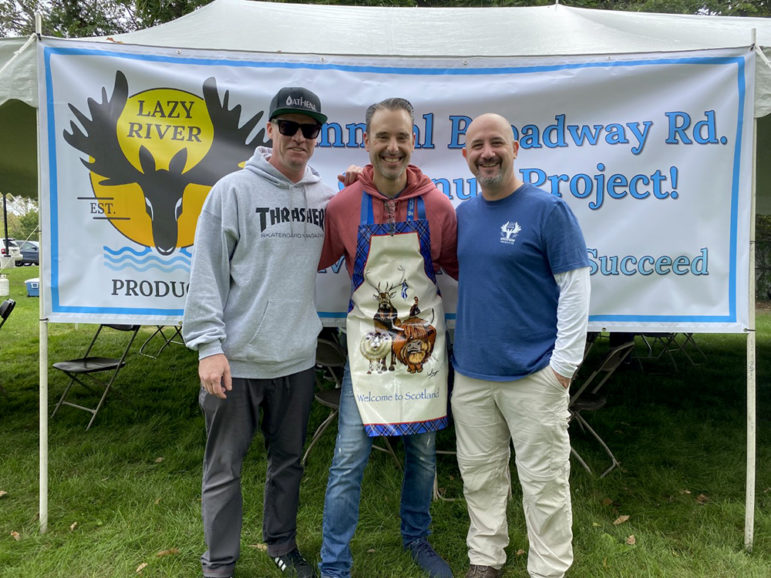
Does Kevin trigger the idea in you?
“Yes. I knew immediately there was a huge opportunity here. That was when Massachusetts was only talking about flipping the laws and going from medical to adult use. Massachusetts was going to open up the flood gates and allow the legal purchase of cannabis. The timing was perfect. The medical market alone was a massive opportunity. In my view, when you are talking about opening up the sale to anybody over twenty-one, then you are opening up for the masses. I saw this as a huge opportunity that could not be missed out on.”
I understand that was when you sold all of your Planet Fitness gyms?
“Correct. I had planned to sell them at the time anyway.”
How do you get enough money to buy twenty Planet Fitness gyms?
“The basis for all of this is, we three, Mark, Kevin, and I, are all self-starters. We are all ground-up guys. None of us were ever handed anything. Nothing. I had a great upbringing. I love Londonderry. We all had to find our way on our own. I dove into a high-tech career. I became a Microsoft Certified Engineer on my own. I bought the books. I sat down and learned it. I didn’t go to any classes. I took the tests and created an opportunity for myself. I got a position with a company and flourished for many years and did very well.
“I was presented with an opportunity to get involved with Planet Fitness when they had five locations only in New Hampshire. They had no proven model. They gave my business partner and me at the time a franchise for free. They said would you guys be willing to open up a spot for us? We said sure. They handed us the license. We had to come up with the money to open it. I opened up my first gym on credit cards, and I took on a massive amount of debt, and I took a chance. Thank God it worked out. It was in Lunenburg, Massachusetts. It was the second franchise location that Planet Fitness ever had. A guy beat us with the Springfield, Mass location. He was the sixth location, and we were the seventh. In about seventeen years, I parlayed that one location into twenty.”
You have several logos for local organizations, including the Dracut Food Pantry, The Clean River Project, Dracut Pop Warner, Dracut Dirt Dogs, and Dollars for Scholars. Your business card reads, “Give Back, Grow, Succeed.” How are you socially impacting your community?
“There’s a whole educational component to this project. We are also not required to, but we have positive impact planning. For example, we have open informational forums for the community to come in and participate and help us educate people about drug use. A huge piece of what we do here is to deter youth from getting involved in drugs in the first place.”
“Giving back is a huge component of what we do here. There is no requirement from the state, and we choose to. It is all based on the cause and what they want. In some cases, organizations are looking for a level of giving. Depending on the level of involvement we will contribute monetarily or energy and resources. We aren’t going to put our names on the backs of jerseys of youth sports. We won’t promote our brand with the youth. We are identifying a need in town. These organization in town are very small and are relying on parents to dip into their pocketbooks and give up time and money. Dracut is a small community. Gigantic organizations don’t come to Dracut because it is not an easy place to get to. It’s not directly off a highway, so you’ll never see a Walmart here. Pop Warner can’t go into a Walmart and ask for a $10,000 donation to cover all their needs. Pop Warner came to us with an opportunity. And I said as long as the CCC is not restricting that, then okay. We were then able to make a donation. We didn’t feel comfortable putting our name on anything, but we were comfortable with making a donation. It’s a good cause.”
How did you arrive at the name and the moose as your logo?
“The three of us were looking for something indicative of New England. The moose was it for us. Lazy River Products, the name, was more a matter when we think of cannabis, we always thought of the feeling of cannabis. We used to go up to the Kancamagus and tie a bunch of tubes together and stick a cooler of beers in one of the tubes and just coast down the river on a sunny day with friends, relaxing and having a great time. Friends, conversation, the feeling of the sun on your face, and all of those things that come out of an experience like that.”
Famed jazz musician, Louis Armstrong:
“Don’t intend to ever stop smoking it, not as long as it grows. And there is no one on this earth that can ever stop it all from growing. No one but Jesus—and he wouldn’t dare. Because he feels the same way that I do about it.”
According to DHHS.NH.gov: There are seven Alternative Treatment Center (ATC) dispensary locations operating in New Hampshire for dispensing therapeutic cannabis. The ATC dispensaries are located in Dover, Merrimack, Chichester, Lebanon, Keene, Plymouth, and Conway. A Qualifying Patient, or their Designated Caregiver, is allowed to purchase cannabis from any ATC location in the state.
